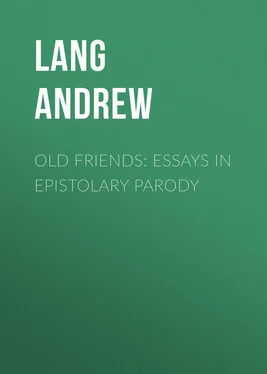Andrew Lang - Old Friends - Essays in Epistolary Parody
Здесь есть возможность читать онлайн «Andrew Lang - Old Friends - Essays in Epistolary Parody» — ознакомительный отрывок электронной книги совершенно бесплатно, а после прочтения отрывка купить полную версию. В некоторых случаях можно слушать аудио, скачать через торрент в формате fb2 и присутствует краткое содержание. Жанр: foreign_antique, foreign_prose, на английском языке. Описание произведения, (предисловие) а так же отзывы посетителей доступны на портале библиотеки ЛибКат.
- Название:Old Friends: Essays in Epistolary Parody
- Автор:
- Жанр:
- Год:неизвестен
- ISBN:нет данных
- Рейтинг книги:4 / 5. Голосов: 1
-
Избранное:Добавить в избранное
- Отзывы:
-
Ваша оценка:
- 80
- 1
- 2
- 3
- 4
- 5
Old Friends: Essays in Epistolary Parody: краткое содержание, описание и аннотация
Предлагаем к чтению аннотацию, описание, краткое содержание или предисловие (зависит от того, что написал сам автор книги «Old Friends: Essays in Epistolary Parody»). Если вы не нашли необходимую информацию о книге — напишите в комментариях, мы постараемся отыскать её.
Old Friends: Essays in Epistolary Parody — читать онлайн ознакомительный отрывок
Ниже представлен текст книги, разбитый по страницам. Система сохранения места последней прочитанной страницы, позволяет с удобством читать онлайн бесплатно книгу «Old Friends: Essays in Epistolary Parody», без необходимости каждый раз заново искать на чём Вы остановились. Поставьте закладку, и сможете в любой момент перейти на страницу, на которой закончили чтение.
Интервал:
Закладка:
Andrew Lang
Old Friends: Essays in Epistolary Parody
The studies in this volume originally appeared in the “St. James’s Gazette.” Two, from a friendly hand, have been omitted here by the author of the rest, as non sua poma . One was by Mr. Richard Swiveller to a boon companion and brother in the lyric Apollo; the other, though purporting to have been addressed by Messrs. Dombey & Son to Mr. Toots, is believed, on internal evidence, to have been composed by the patron of the Chicken himself. A few prefatory notes, an introductory essay, and two letters have been added.
The portrait in the frontispiece, copied by Mr. T. Hodge from an old painting in the Club at St. Andrews, is believed to represent the Baron Bradwardine addressing himself to his ball.
A. L.FRIENDS IN FICTION
Every fancy which dwells much with the unborn and immortal characters of Fiction must ask itself, Did the persons in contemporary novels never meet? In so little a world their paths must often have crossed, their orbits must have intersected, though we hear nothing about the adventure from the accredited narrators. In historical fiction authors make their people meet real men and women of history – Louis XI., Lazarus, Mary Queen of Scots, General Webbe, Moses, the Man in the Iron Mask, Marie Antoinette; the list is endless. But novelists, in spite of Mr. Thackeray’s advice to Alexandre Dumas, and of his own example in “Rebecca and Rowena,” have not introduced each other’s characters. Dumas never pursued the fortunes of the Master of Ravenswood after he was picked up by that coasting vessel in the Kelpie’s Flow. Sometimes a meeting between characters in novels by different hands looked all but unavoidable. “Pendennis” and “David Copperfield” came out simultaneously in numbers, yet Pen never encountered Steerforth at the University, nor did Warrington, in his life of journalism, jostle against a reporter named David Copperfield. One fears that the Major would have called Steerforth a tiger, that Pen would have been very loftily condescending to the nephew of Betsy Trotwood. But Captain Costigan would scarcely have refused to take a sip of Mr. Micawber’s punch, and I doubt, not that Litimer would have conspired darkly with Morgan, the Major’s sinister man. Most of those delightful sets of old friends, the Dickens and Thackeray people, might well have met, though they belonged to very different worlds. In older novels, too, it might easily have chanced that Mr. Edward Waverley of Waverley Honour, came into contact with Lieutenant Booth, or, after the Forty-five, with Thomas Jones, or, in Scotland, Balmawhapple might have foregathered with Lieutenant Lismahagow. Might not even Jeanie Deans have crossed the path of Major Lambert of the “Virginians,” and been helped on her way by that good man? Assuredly Dugald Dalgetty in his wanderings in search of fights and fortune may have crushed a cup or rattled a dicebox with four gallant gentlemen of the King’s Mousquetaires. It is agreeable to wonder what all these very real people would have thought of their companions in the region of Romance, and to guess how their natures would have acted and reacted on each other.
This was the idea which suggested the following little essays in parody. In making them the writer, though an assiduous and veteran novel reader, had to recognise that after all he knew, on really intimate and friendly terms, comparatively few people in the Paradise of Fiction. Setting aside the dramatic poets and their creations, the children of Molière and Shakspeare, the reader of novels will find, may be, that his airy friends are scarce so many as he deemed. We all know Sancho and the Don, by repute at least; we have all our memories of Gil Blas; Manon Lescaut does not fade from the heart, nor her lover, the Chevalier des Grieux, from the remembrance. Our mental picture of Anna Karénine is fresh enough and fair enough, but how few can most of us recall out of the myriad progeny of George Sand! Indiana, Valentine, Lélia, do you quite believe in them, would you know them if you met them in the Paradise of Fiction? Noun one might recognise, but there is a haziness about La Petite Fadette. Consuelo, let it be admitted, is not evanescent, oblivion scatters no poppy over her; but Madame Sand’s later ladies, still more her men, are easily lost in the forests of fancy. Even their names with difficulty return to us, and if we read the roll-call, would Horace and Jacques cry Adsum like the good Colonel? There are living critics who have all Mr. George Meredith’s heroines and heroes and oddities at their finger ends, and yet forget that musical name, like the close of a rich hexameter, Clare Doria Forey. But this is a digression; it is perhaps admitted that George Sand, so great a novelist, gave the world few characters who live in and are dear to memory. We can just fancy one of her dignified later heroines, all self-renunciation and rural sentiment, preaching in vain to that real woman, Emma Bovary. Her we know, her we remember, as we remember few, comparatively, of Balzac’s thronging faces, from La Cousine Bette to Séraphitus Séraphita. Many of those are certain to live and keep their hold, but it is by dint of long and elaborate preparation, description, analysis. A stranger intermeddleth not with them, though we can fancy Lucien de Rubempré let loose in a country neighbourhood of George Sand’s, and making sonnets and love to some rural châtelaine , while Vautrin might stray among the ruffians of Gaboriau, a giant of crime. Among M. Zola’s people, however it may fare with others, I find myself remembering few: the guilty Hippolytus of “La Curée,” the poor girl in “La Fortune des Rougon,” the Abbé Mouret, the artist in “L’Oeuvre,” and the half idiotic girl of the farm house, and Hélène in “Un Page d’Amour.” They are not amongst M. Zola’s most prominent creations, and it must be some accident that makes them most memorable and recognisable to one of his readers.
Probably we all notice that the characters of fiction who remain our intimates, whose words come to our lips often, whose conduct in this or that situation we could easily forecast, are the characters whom we met when we were young. We may be wrong in thinking them the best, the most true and living of the unborn; perhaps they only seem so real because they came fresh to fresh hearts and unworn memories. This at least we must allow for, when we are tempted to say about novelists, “The old are better.” It was we who, long ago, were young and better, better fitted to enjoy and retain the pleasure of making new visionary acquaintances. If this be so, what an argument it is in favour of reading the best books first and earliest in youth! Do the ladies who now find Scott slow, and Miss Austen dull, and Dickens vulgar, and Thackeray prosy, and Fielding and Richardson impossible, come to this belief because they began early with the volumes of the circulating library? Are their memories happily stored with the words and deeds of modern fictitious romps, and passionate governesses, and tremendous guardsmen with huge cigars? Are the people of – well, why mention names of living authors? – of whom you will – are those as much to the young readers of 1890 as Quentin Durward, and Colonel Newcome, and Sam Weller, and Becky Sharp, and Anne Elliot, and Elizabeth Bennett, and Jane Eyre were to young readers of 1860? It may very well be so, and we seniors will not regret our choice, and the young men and maids will be pleased enough with theirs. Yet it is not impossible that the old really are better, and do not gain all their life and permanent charm merely from the unjaded memories and affections with which we came to them long ago.
We shall never be certain, for even if we tried the experiment of comparing, we are no longer good judges, our hearts are with our old friends, whom we think deathless; their birth is far enough off in time, but they will serve us for ours.
Читать дальшеИнтервал:
Закладка:
Похожие книги на «Old Friends: Essays in Epistolary Parody»
Представляем Вашему вниманию похожие книги на «Old Friends: Essays in Epistolary Parody» списком для выбора. Мы отобрали схожую по названию и смыслу литературу в надежде предоставить читателям больше вариантов отыскать новые, интересные, ещё непрочитанные произведения.
Обсуждение, отзывы о книге «Old Friends: Essays in Epistolary Parody» и просто собственные мнения читателей. Оставьте ваши комментарии, напишите, что Вы думаете о произведении, его смысле или главных героях. Укажите что конкретно понравилось, а что нет, и почему Вы так считаете.












